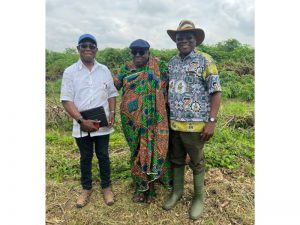
An 11-Member Zimbabwean delegation, led by Senator M. Mavhunga of the Mashonaland Central Province and Minister of State for Provincial Affairs and Devolution, has paid a one-week working visit to Ghana.
Other members of the delegation included Comrade Lawyer Dorothy K. Mutsimbi, Personal Assistant to Minister Mavhunga, and Comrade John Mapondera.
The delegation was met on arrival in Kumasi by Nana Nanabanyin Ninsin-Imbeah II, Ex-Nyimfahen of the Mfantseman Council in the Ashanti Region, who happens to be an elder nephew of the late Ghanaian First Lady of Zimbabwe, Amai Sally Frances Mugabe.
It visited the Kwame Nkrumah of Science and Technology (KNUST) demonstration farm at Anwomaso to learn about cassava processing, which concept has been developed by Prof. Emmanuel Y.H. Bobobee, an Associate Professor of Agricultural Machinery Engineering at KNUST.
Prof. Bobobee, who was a Specialist Researcher in Agricultural Mechanisation at the Agricultural Research Council, Institute for Agricultural Engineering (ARC-IAE) in Pretoria, South Africa, from 2013 to 2015, told The Ashanti File at the farms that the members of the Zimbabwean delegation sought to acquaint themselves with the processes of mechanized cassava production towards Zimbabwe’s bid to venture into cassava production on a large scale.
According to the renowned researcher, Zimbabwe had about 83,000 hectares of land intended for the cultivation of cassava with high starch content for industrial purposes.
Prof. Bobobee said, per the concept at the KNUST demonstration farm, 80 tonnes of cassava could be harvester per hectare.
The concept of mechanized cassava production, he said, was designed to remove drudgery in cassava production and ensure food security in Ghana, and Africa as a whole.
The delegation, which also visited the Ayensu Starch Factory and parts of the Afram Plains, has, since last Saturday, gone back to Zimbabwe.










